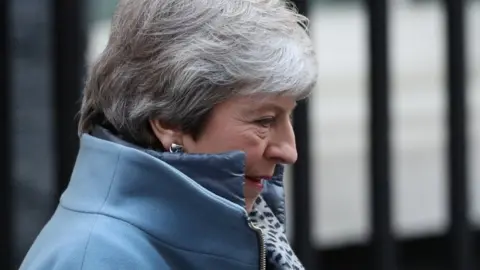Huawei leak row: Government 'cannot exclude' criminal investigation
The culture secretary has said it is possible there could be a criminal investigation into a leak from a National Security Council meeting.
Intelligence agencies must be confident that advice given to ministers is kept private, Jeremy Wright told MPs.
The Daily Telegraph reported that the NSC had agreed to let Chinese firm Huawei help build the UK's 5G network.
Former defence secretary Sir Michael Fallon said the leak was "too serious" for a standard Whitehall inquiry.
Sir Michael, who was defence secretary between 2014 and 2017, said everyone who was at the meeting should be subject to a "proper Scotland Yard investigation", and it was an "offence to divulge secret information from the most secret of all government bodies, which is the National Security Council".
The NSC is made up of senior cabinet ministers. Chaired by the prime minister, it meets every week to discuss government objectives concerning national security - with other ministers, officials and senior figures from the armed forces and intelligence invited when needed.
It is a place where secret intelligence can be shared by GCHQ, MI6 and MI5 with ministers, all of whom have signed the Official Secrets Act.
But following Tuesday's meeting, the Daily Telegraph reported that the NSC had agreed to allow Chinese telecoms giant Huawei limited access to help build Britain's new 5G network, amid warnings about possible risks to national security.
It also reported that various ministers had raised concerns about the plan.
Former National Security Adviser Lord Ricketts told the BBC it was the first time anyone had committed a major leak from the NSC since its inception in 2010. He added that he was in favour of a full inquiry, possibly involving MI5 investigators, "to make the culprit feel very uncomfortable".
 PA
PATheresa May's official spokesman declined to confirm whether a government leak inquiry was under way but said: "The prime minister is clear that the protection of information on matters of national security is of the highest importance."
Earlier, Mr Wright told the House of Commons: "We cannot exclude the possibility of a criminal investigation here and everyone will want to take seriously that suggestion."
He said security officials "need to feel they can give advice to ministers, which ministers will treat seriously and keep private, and if they do not feel that they will not give us that advice and government will be worse as a result".
BBC political editor Laura Kuenssberg said, in addition to the security issue, anger about the leak demonstrated the frustration inside the government at the breakdown of discipline:
Allow X content?
For Labour, shadow Cabinet Office minister Jo Platt said: "If the leak was for an advantage in a Tory leadership race, that would be truly shocking.
"Critical issues of national security should be handled with utmost care, not used as political ammunition in a Tory party civil war."
Foreign Secretary Jeremy Hunt has denied the leak came from him, saying it was "utterly appalling". Defence Secretary Gavin Williamson also denied the leak came from him.
Home Secretary Sajid Javid said leaking sensitive information was "completely unacceptable" adding: "If it happens it should absolutely be looked at."
What was the leak about?
Ministers at the NSC meeting were deciding whether or not to allow equipment from Huawei to be used to construct the new 5G data network - a decision that could have long-term consequences for national security.
There are fears that giving the Chinese company a key role could open the UK network to espionage.
But Huawei has denied there is any risk of spying or sabotage, or that it is controlled by the Chinese government.
According to the Daily Telegraph, Huawei would be allowed to help build the "non-core" parts of the UK's 5G network, such as antennas.
There has been no formal confirmation of Huawei's role in the 5G network and No 10 said a final decision would be made at the end of spring.

Why does the leak matter?
By BBC security correspondent Frank Gardner

The leak from Tuesday's National Security Committee meeting is both serious and unprecedented.
Lord Ricketts, a former National Security Adviser in David Cameron's government, confirmed there had never before been a "major, deliberate leak" immediately following an NSC meeting.
He is in favour of a formal investigation while others go further, calling for a criminal inquiry involving the police and MI5.
So, just why is it so serious?
Because the NSC is supposed to be the one place in Whitehall where highly sensitive secret intelligence can be openly shared with ministers.
Those present will have signed the Official Secrets Act, clearing them to handle secret intelligence.
Breaking that "circle of trust" risks undermining the work of Britain's three intelligence agencies - GCHQ, MI5 and MI6 - potentially putting agents in danger.
Historically, leak inquiries rarely find the culprit, although in this case there may be an electronic trail that would expose the leaker.
What they will do, however, says Lord Ricketts, is to put the fear of God up the culprit, thereby discouraging them from ever doing it again.

Why are people worried about Huawei?
There have been warnings in the US since at least 2012 that equipment from Huawei poses a security threat.
Last year a UK government report said it could provide "only limited assurance" that the company's infrastructure did not pose a threat to national security.
Now the US wants its allies in the "Five Eyes" intelligence grouping - the UK, Canada, Australia and New Zealand - to exclude the company.
Australia last year blocked its networks from using Huawei's 5G gear.

What is 5G?
 Getty Images
Getty Images5G is the next (fifth) generation of mobile internet connectivity, promising much faster data download and upload speeds, wider coverage and more stable connections.
Existing spectrum bands are becoming congested, leading to breakdowns - particularly when many people in one area are trying to access services at the same time.
5G is also much better at handling thousands of devices simultaneously, from phones to equipment sensors, video cameras to smart street lights.
Current 4G mobile networks can offer speeds of about 45mbps (megabits per second) on average. Experts say 5G - which is starting to be introduced in the UK this year - could achieve browsing and downloads up to 20 times faster.

